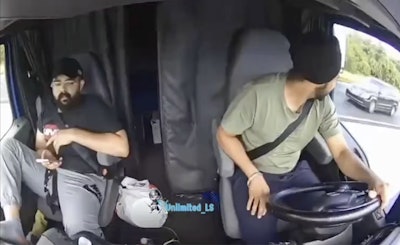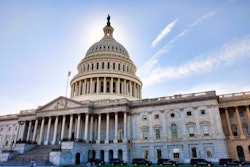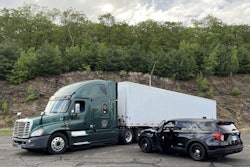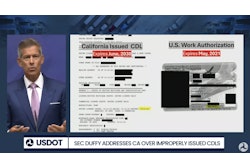
Harjinder Singh, the truck driver involved in the Florida turnpike crash on August 12, never did complete that illegal, ill-advised U-turn that killed a family of three, but since that fateful day the entire federal government itself has done a 180 on non-citizen drivers.
Now, after allegations from DOT and an emergency rulemaking that aims to separate nearly 200,000 non-domiciled CDL holders from their licenses, the state of Washington has finally explained how Singh, an asylum seeker previously ruled an illegal alien, got a full-term CDL.
Singh faces three manslaughter charges and three counts of vehicular homicide and a Florida Attorney General who said he wants to "make sure he gets locked up for as long as possible before then getting deported back where he's from."
Singh's fleet, White Hawk Carriers, has since been shut down by FMCSA and subpoenaed by Florida's AG, who also "issued legal demands to California and Washington for their role in issuing the commercial driver’s license."
Washington, in particular, had a lot to answer for after a DOT investigation where Secretary Sean Duffy and Federal Motor Carrier Safety Administration Chief Counsel Jesse Elison said the state had issued Singh, a non-citizen living in the country with asylum status, a full-term CDL rather than what he should have gotten, a non-domiciled CDL.

[Related: DOT threatens funding for California, Washington, New Mexico over lax ELP enforcement]
California's DMV would later issue the correct, non-domiciled credential, and said in prior Overdrive reporting that it followed "all federal and state laws in reviewing and granting Mr. Harjinder Singh his California commercial driver's license," including by checking federal databases. DOT, however, in its recent rulemaking functionally ending CDL issuance to non-citizens outside of those holding select categories of visas, said Singh was in the country illegally, and would not have been able to get a CDL under the new rule.
But why did Washington grant Singh a full-term CDL?
Overdrive inquired with the state and heard back that Washington did in fact make a mistake in issuing Singh, and hundreds of others, a full-term, standard CDL.
"Immediately after the fatal crash in Florida, the Department of Licensing (DOL) began an internal review to determine the circumstances surrounding the issuance of a standard CDL to Harjinder Singh," a Washington DOL representative told Overdrive. The rep explained that "standard CDLs and non-domicile CDLs require the same training standards and testing protocols, which are standardized nationwide."
However, non-domiciled CDLs "expire when the individual’s work authorization expires," unlike standard CDLs.
DOT found several states, mostly California, issuing CDLs for months or years longer than an applicant's work authorization or length of legal stay in the country expires. Washington, California, Colorado, Texas, South Dakota and Pennsylvania have all "issued non-domiciled CDLs in violation of the regulatory requirements," DOT's recent rulemaking said.
Washington's investigation "concluded that Mr. Singh should have been issued a non-domicile CDL," Washington DOL said. "Upon identifying this issue, DOL instituted mandatory staff training on processing non-domicile CDLs. Additionally, all CDL transactions are reviewed by office supervisors at the end of each day."
The Washington licensing department's "internal investigation determined that a lack of staff training and experience led to the individual being issued a standard CDL instead of a non-domiciled CDL," the rep said. Non-domiciled CDLs there are issued "far less often and are a more complex process than issuing standard CDLs," and they represent just 5% of CDL issuances and 0.18 percent of all license issuances.
Singh, also, wasn't alone among non-citizens in getting a full-term CDL from the state. However, the state said it will correct those errors.
"DOL’s review also found a total of 685 instances in which a driver incorrectly received a standard CDL instead of a non-domicile CDL between January 1, 2018, and August 31, 2025," the DOL rep said. "All of those drivers were fully qualified to operate a commercial motor vehicle and were entitled to receive a CDL, but their credential was incorrectly not designated as 'non-domicile.'"
An Overdrive report in April included data from Washington's DOL that showed the state issued 1,823 non-domiciled CDLs and 11,219 standard CDLs in 2024. DOT's new rule on non-domiciled CDLs requires the words "non-domiciled" be "conspicuously and unmistakably displayed” on the license.
Now Washington's DOL says it's working with FMCSA "to improve processes, procedures and systems." The state's licensing department provided this list of actions initiated in the wake of the investigation:
- Contacting the drivers with active licenses who were issued standard CDLs when non-domiciled CDLs were the appropriate credential. Drivers were instructed to return to a Washington driver's license office for the correction with a deadline of Oct. 10, 2025. Those who do not respond by that date will have their CDL canceled.
- Training and ongoing communications with license office staff on processes for issuing CDLs, and critical steps specific to issuing non-domiciled CDLs.
- Making system changes and adding more auditing functions to bolster fail-safe measures to minimize the chance for human error.
Overdrive contacted California Department of Motor Vehicles reps several times looking for comment on DOT's most recent allegations of widespread wrongdoing in non-domiciled CDL licensing. No response has been received.











